
Frank Miller Owns Batman: “thank you. i love you.”
July 12th, 2011 by david brothers | Tags: frank miller, jim leeBatman is an idea. Well, several ideas which all sort of intertwine, like a double (quadruple?) helix. He is the idea that there is someone out there who will make the world make sense for us. He is a protector and avenger, someone who lurks the dark alleys and does the hard thing in order to keep us safe. He’s the idea that one person can make a difference. He’s the idea that you can, and should, choose right over wrong and justice over fear. He’s all of these ideas, which, when you boil it down, he probably comes down to being all about safety, both the creation or comfort thereof. The existence of a Batman means that you live in a world where you can, and maybe will, be safe.
Batman is an idea that is both inspirational and aspirational, depending on who you talk to. He either gives you the strength to go on, or mobilizes you to emulate him.
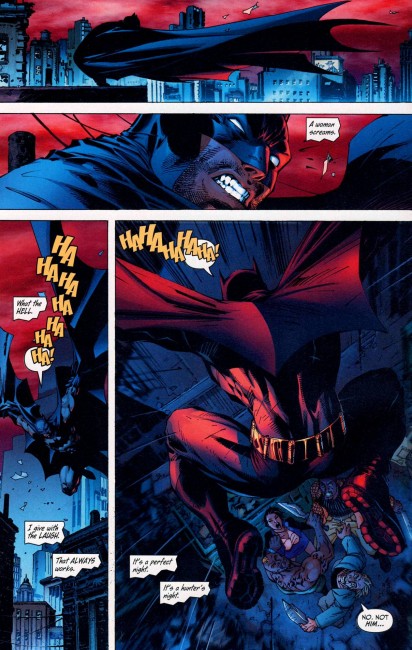
Take a look at the average Jane on the street, one of a species known for walking down dark alleys for no good reason. Three thugs with entirely unlikely knives set upon her in a dark alley… and Batman drops out of the night to save her. He’s in full The Shadow mode, here. The laugh sends chills down the spine of the punks. They know exactly who he is. They’re familiar with the idea of Batman. He brutalizes them. They stand no chance, and he makes it a point to make them pay.
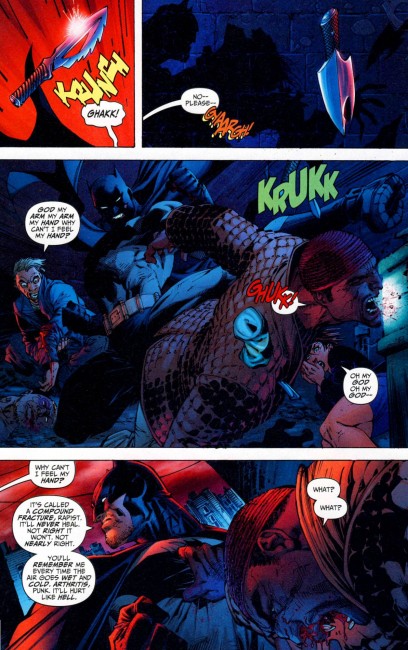
It’s violent, and it’s ugly, but more than anything, it is order imposing itself on chaos. Batman is there to set things right, and right in this situation means that the people who would hurt innocents get what’s coming to them. It’s more than a beating. He makes it a point to give them wounds that will affect their lives for years. It’s psychological warfare. It’s a deterrent. It’s terrorism.
“Striking terror. Best part of the job.”
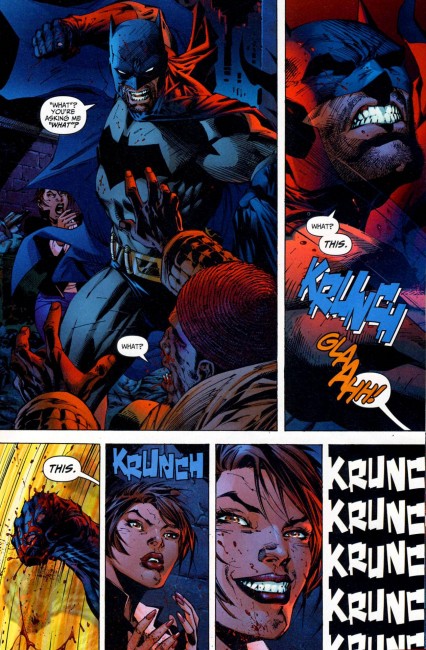
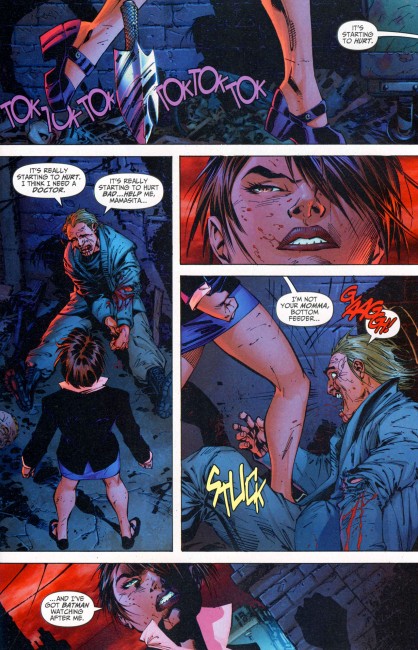
The woman, our young Gotham professional with extraordinarily bad luck, watches the beating with fear, and then awe, and then admiration. She went from a situation in which she had no control at all to one in which the people who wanted to hurt her where put entirely out of commission. It gives her faith and confidence, but more than that, it gives her an opportunity to regain control, now that she has a guardian angel. She walks past a knife that was just at her throat and delivers a kick to the crotch of a would-be assailant. “I’ve got Batman watching after me,” she says.
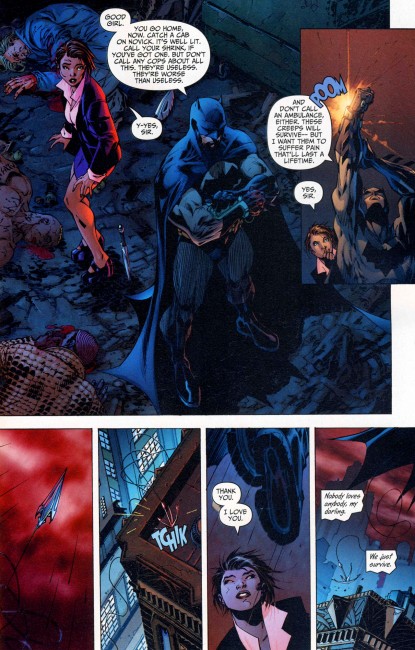
The existence of Batman, the idea of him, gives her strength. She witnesses the brutal, ugly violence that is his trademark, and sees the idea behind it. “Evil will not win.” She thanks him. She says she loves him. And she does, in the same way that we love anything that gives us strength, from music to movies to family. He’s inspirational. He’s the father that’s always there for you and can rejuvenate your confidence with a smile and nod.
Next: Batgirl.
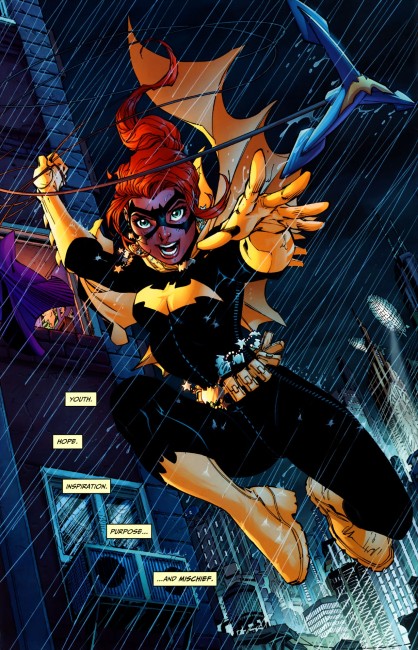
Children take to ideas like fish to water. They’re naturally inquisitive, since everything is new, and they’re pliable. If you can convince a kid of something, they’ll argue it with someone else until the cows come home, whether or not. They’re susceptible to new ideas, and more than that, willing to really believe in them.
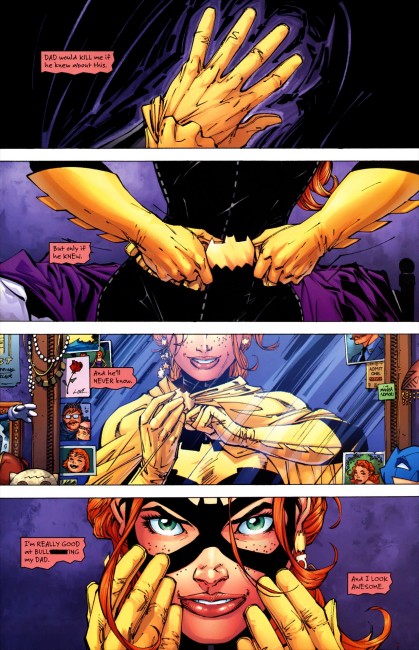
Batgirl gets Batman. Really gets him. She understands what he brings to the table, and she’s more than willing to take it all the way. Batgirl was Batman, Inc. before Batman, Inc. was cool. She’s taking his symbol and style and remixing it for her own personal use. Where Batman was born in pain and suffering, Batgirl was borne out of inspiration and exhilaration. Life can be better. Batgirl is going to make it better by staking a claim.
It’s about fighting crime as much as it is about getting a thrill. Babs Gordon is cocky and confident, and she’s out to make a name for herself. She claims the arcade (the same arcade from Dark Knight Returns that Carrie Kelly hung out at) in the name of “the fucking Batgirl.” Earlier, she refers to Gotham as “her city.”
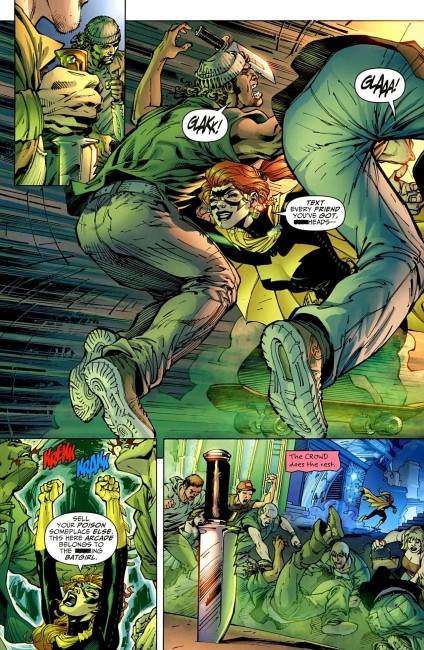
If Batman represents the triumph of one many over the injust, Batgirl represents a city that’s willing to rise up and police its own. She’s the civilan who looks at injustice and gets proactive. She even inspires the crowd at the arcade to get in on the action and reject the drug dealers. The encounter turns more violent than she’d intended.
Batgirl is still just a teenager, and she doesn’t have the reputation of Batman yet. He controls the thugs he fights by way of his reputation and prowess. They know that when he arrives, they’re in trouble. They’ve been taught to fear him, and fear spreads like a virus.
There is power in the idea of Batman, but that power isn’t enough in and of itself. You need more than just will and enthusiasm to be a Batman. Batgirl will eventually get there, but in this first stab at taking back her city, she doesn’t quite have the reputation she needs. She hasn’t become an idea yet.
I think that Batgirl is a stronger, or maybe a healthier, idea than Batman. Batman, as an idea, requires a sacrifice. Someone has to be the one to take one for the team and live a broken life. Batman doesn’t get friends or lovers like normal people do. He has family, but it’s a family united in a very specific crusade. There’s a engine made of tragedy driving them. Even Tim Drake, way back when, wanted to be Robin because there has to be a Robin, or else Batman is lost. Sacrifice.
The idea of Batgirl, though, doesn’t have tragedy at the heart of it. She’s doing it because it’s fun, because it’s a thrill, and because it’s the right thing to do. Her parents aren’t dead, she wasn’t beaten into desiring vengeance, and she wasn’t guilted into the gig. She looked up and saw someone else doing the right thing and said, “I want to do that, too.” While Bruce Wayne is Batman, forever and ever, Batgirl can take off the mask if she needs to.
Put differently: Batman is the demon that materializes out of the night. When I think of Batgirl, I think of this Marcos Martin piece:
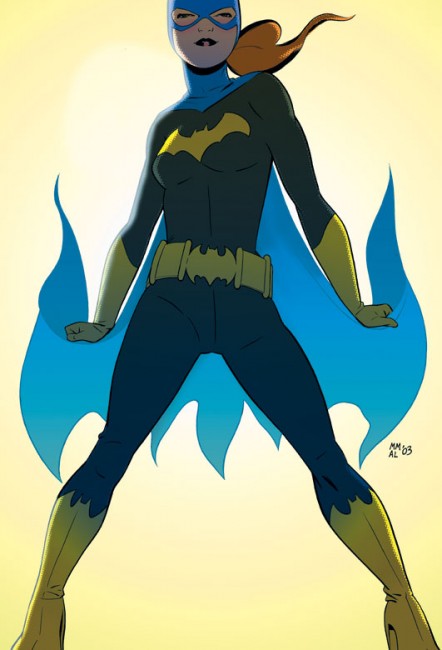
Dark Knight, meet Dark Angel.
next: trust me, it really is better with the masks on.

Holy shit, positive commentary about All-Star Batman and Robin. Not even Chris Sims has managed this. David Brothers, not unlike porno chick bitches, you rip hardcore :c00lbert:
I know, isn’t it great? I an oasis of hate and horrible opinions that is comic fandom, finally we have people who understand why Miller is an amazing storyteller. Even if I would have preferred a more Miller-esque artist on art duties. Lee tries, but the coloring overpowers his blacks.
What I’ve always wondered is how Batgirl fits into this Bat-universe of loss and redemption. Usually when a side-kick is introduced, the idea is that the main hero replaces that side-kick’s notion of a parent to look up to. Since Batgirl has her father, does that mean she looks up to Batman above her father? Is that why in some future-stories, she’s depicted as either still the information-broker to the next Batman or a new Commissioner Gordon?
And I think it is interesting that she replaces the male role of these stories rather than just becoming the subservient female role.
– l.k.
I dunno. This doesn’t seem to me like he’s encouraging order so much as fostering anarchy. Just because the wave of violence turns against the criminals, doesn’t mean the city’s on the right track. He’s attacking the criminal element, but he’s also sort of attacking the infrastructure a city needs to survive. He’s teaching the people to believe in violence and to disregard the police. Is that really a step up? Does he want people to rely on him alone, or on their own mettle to fight crime? Yes, I’m sure the city’s government is corrupt and unreliable, but what is he replacing it with? Just himself? His devotees? Without a government of some kind the city devolves into one big battleground. Instead of ending the gang fights, he’s helping the populace to adapt to the criminal mindset.
“This is my turf, things run the way I want them to, or else you get hurt.”
Heck, from the gangs’ point of view, he’s more an agent of chaos than anything else. There was already an “order” which they lived by, and he’s disrupting it to replace it with something that, to me, isn’t too much different. The only real change will be that passive citizenry who don’t want to fight will become more and more a thing of the past, and Gotham as a whole will grow more and more ruthless an environment.
I’m not saying Miller’s take on the character isn’t valid, but it’s more of a “re-interpretation” than an “owning.” This is a facet of what Batman can be, but it’s not the end-all be-all. This is a Batman unlike most of his other incarnations. He’s intriguing, but he’s also reckless and sadistic and, quite frankly, just the sort of punk that many of the other Batmen would fight.
I like to think that Miller’s Batman is a “young” Batman, and that, were the series to continue, he would experience a maturation period. He would sober as the novelty and thrill of battle lessens, as the consequences of his actions echo, and learn to think in larger terms, to act with greater consideration, to discipline himself and shave that damn stubble.
But I kind of doubt it.
I like to think that Miller’s Batman is a “young” Batman, and that, were the series to continue, he would experience a maturation period. He would sober as the novelty and thrill of battle lessens, as the consequences of his actions echo, and learn to think in larger terms, to act with greater consideration, to discipline himself and shave that damn stubble.
-> End of issue 9 shows exactly what you are talking about here. After Robin nearly kills Hal Jordan, Batman realizes his mistaks and rediscovers his humanity. (unmasking)
Also I loved how Batgirl owns up to what she did in issue 10. The whole sequence of Babara talking with Gordan and Gordan calling Sarah was extremely well done.
@Joe England: ASBAR is explicitly Year Two of Batman’s career, and the story of how he softened his methods and rediscovered his humanity by way of Robin’s influence. So, yeah, he’s absolutely a younger Batman, and one that is unbelievably high on his own ego. Robin breaks that down.
And he’s not fostering anarchy at all. GCPD is thoroughly corrupt from the top down at this point in time. From what I remember, Gordon and Bullock lead the charge in cleaning out the corruption of the police department. So, when he says don’t trust the police, it’s for good reason. He’s refusing to support and ally himself with the corrupt officers in the GCPD. He’s not tearing down Gotham as an institution.
Citizens have several different ways to fight. It’s not just about sticks and guns. Part of having a guardian angel is being able to stick your neck out for various other projects–beautification, neighborhood watch, whatever whatever. So, yeah, some will react with violence. Others won’t.
This bit:
He’s not unlike most of his other incarnations. He’s still incontrovertibly Batman. He hasn’t done anything that Batman wouldn’t do. Within context, he makes perfect sense, and it’s reasonable to think that Batman would go through a phase where he needed to be shown his limits.
Every writer’s take on a character is a re-interpretation. For my money, Miller owns Batman because his take is the most interesting and the one that makes me like the character the most.
@Bruce Kim: Yeah, that scene was fantastic. The way that Babs knows it’s a bad thing, but that it’d be a good thing and make her dad happy… good stuff.
It’s true that Batgirl doesn’t have tragedy tied up in the Batgirl identity. (Though outside of it, depending on what origin story you’re going with, she did have a set of parents who died, and even before The Killing Joke, she does have darkness to her, even if she is a far more cheerful person than Batman. And yeah, she’s emotionally healthier than Batman, mostly.)
Her inspiration is seeing the good work that the Commissioner and Batman do. She sees the value of it, realizes that she can make a difference too, and wants to be a part of it all. So she makes that happen.
But I hesitate to agree with the idea that it’s without sacrifice. Batman’s family is in on it with him. From Alfred down to every last Robin, he has their support: be it emotional support, having people to bounce ideas off of, or simply the knowledge that he’s got people in his corner. Cooking, cleaning, clothes, Alfred takes care of it. In the field he’s got sidekicks and allies. And then there’s the inexhaustible money, gadgets, resources.
But Batgirl? She has to lie to her family, for their sake. She doesn’t get to relax that way, she doesn’t get the ease and comfort that comes with not having to actively hide and try to keep secrets from her loved ones. I realize that’s a thing for a great number of superheroes, but in comparing Batman to Batgirl, I think it’s pretty significant. She’s not rich, and as an adult she works a full-time job in addition to being Batgirl. If she needs something she can go to Batman, but as generous as he may be, there’s got to be some discomfort there.
As for her social life, she’s got it worse than Batman. Every once in a while you have a story where Batman reveals his identity to a love interest, and he can do that. It’s his gig, his risk. Bruce Wayne can afford to flee the country or whatever if word gets out. Batgirl revealing her identity is riskier, because of who she is in relation to the Commissioner and Batman.
Whereas Batman and Robin have the Justice League and Teen Titans, Batgirl mostly just has Batman and Robin.
Of course, in Frank Miller’s version here, she’s a very bubbly high schooler and cool with the idea of “bullshitting her dad”, which doesn’t quite add up in my head. But hey, at least he remembered her existence in this one. =/
Batgirl was Batman, Inc. before Batman, Inc. was cool.
On that we can definitely agree. XD
@Maddy: Where do you stand on whether or not Jim Gordon knows Babs’s secret? I always assumed that it was like how he knows that Batman is Bruce Wayne but refuses to admit it (per Year One, DKR, and the half a dozen comics where he’s like “Don’t pull your mask off because we’re buddies you idiot because then I won’t have plausible deniability you’re so awkward Batman geez”). She lies to her dad, but it’s almost like a game they play, with both of them knowing the truth.
@david brothers: I tend to go with the idea that he suspects, figures it out, then tries to ignore it/pretend he doesn’t know, but that she either doesn’t realize he knows or deludes herself into thinking he doesn’t know.
It seems like a realistic situation, where the child tries to hide something but the parent sees through it and doesn’t let on, rather than the two of them confronting it and having to deal with it.
(Despite often being emotionally healthier overall than Bruce and his family, I see avoidance being something that runs strong with the Gordons. Part of it can be blamed on a relative lack of interest that DC has in them, I suppose, but you just about never see them talk about Barbara’s other parents, Jim’s divorce, and –until recently with Snyder’s Detective run– James Jr. Then there’s that whole question of her parentage, where Jim may or may not be her actual biological father. They both have questions that they may not ever want the answers to, but they’re able to set it aside and still have a good relationship. It’s also canon that Babs doesn’t like to talk about TKJ with either Jim or Batman if she can help it, because she hates dealing with their guilt over it.)
Later on, though, it makes sense that she can be more honest. As Oracle she’s grown-up, while she still works with Batman she does her own thing, and she’s had the experience of sharing both sides of her life with more people, so overall it seems like less of a big deal.
There’s a scene in Birds of Prey I love, where Babs decides to tell Jim that she was Batgirl and that she’s Oracle. He responds with something like, “Okay, the Batgirl thing, I knew. But while I knew you had some unusual friends, I had no idea you were the Great and Powerful Oz.”
IIRC, it was similar to pre-Crisis Batgirl, where she told him she was Batgirl just as he revealed he knew it was her.
This is some pretty slick commentary/analysis. I was with you right up to here:
“I think that Batgirl is a stronger, or maybe a healthier, idea than Batman.”
In your framing, Batgirl might be a more upbeat/positive idea than Batman, but I don’t think she’s a stronger/healthier one — because the idea of Batman is a fundamentally more *honest* one. Real heroism (or real excellence) demands some form of sacrifice.
Genuinely good deeds, good works, and/or truly impressive feats of any kind have a cost, and implying otherwise has always struck me as intellectually disingenuous. Look at anyone who is considered the best in their field and you’ll find someone who gave up other elements/aspects of their life in order to become great. The Batman story is the story of the genius athlete/scientist/statesman/activist/artist distilled into superhero form. It tells us we have the capacity to be great, so long as we’re brave/strong enough to pay the price to get there.
This isn’t to hate on Batgirl, she’s an awesome character in her own right — but she’s not tapped into a primal myth/story the same way Batman is. IMHO, she’s tangible proof of his capacity (and thereby any inspirational figure’s capacity) to inspire, rather than a fundamental source of inspiration herself — though I suppose if you want to take this analysis out another level, her presence in the Bat-mythos somewhat broadens the symbolic nature of Batman to explicitly encompass the inspirations/aspirations of girls and women as well (though as ASBAR sequence you excerpt shows, Batman is more than capable of inspiring women directly).
Anyway, thanks for reminding (and even clarifying) me of one of the reasons I like Batman. For all the suspension-of-belief stretching genre trappings, there’s something honest and real at the base of his core concept — something that makes him sympathetic and rootable in a way that many other superheroes (:cough: Superman :cough:) are not.
[…] Frank Miller’s portrayal of Batman as an idea This mirrors some of my own thoughts about how Batman affects the average citizen and how Miller shows that. Also some good musings on Batgirl. […]